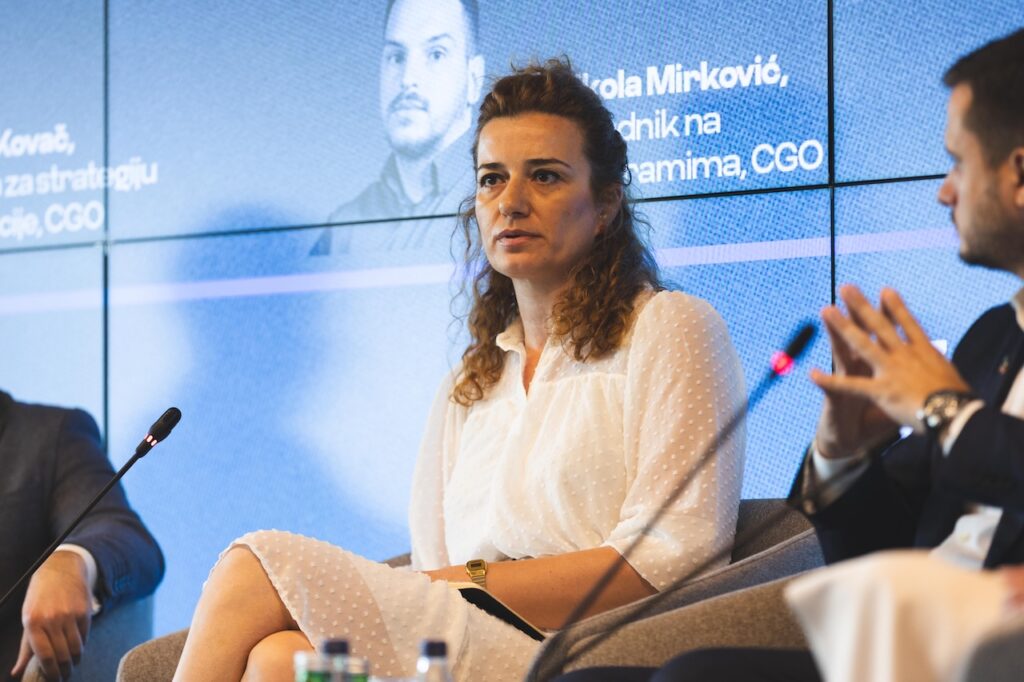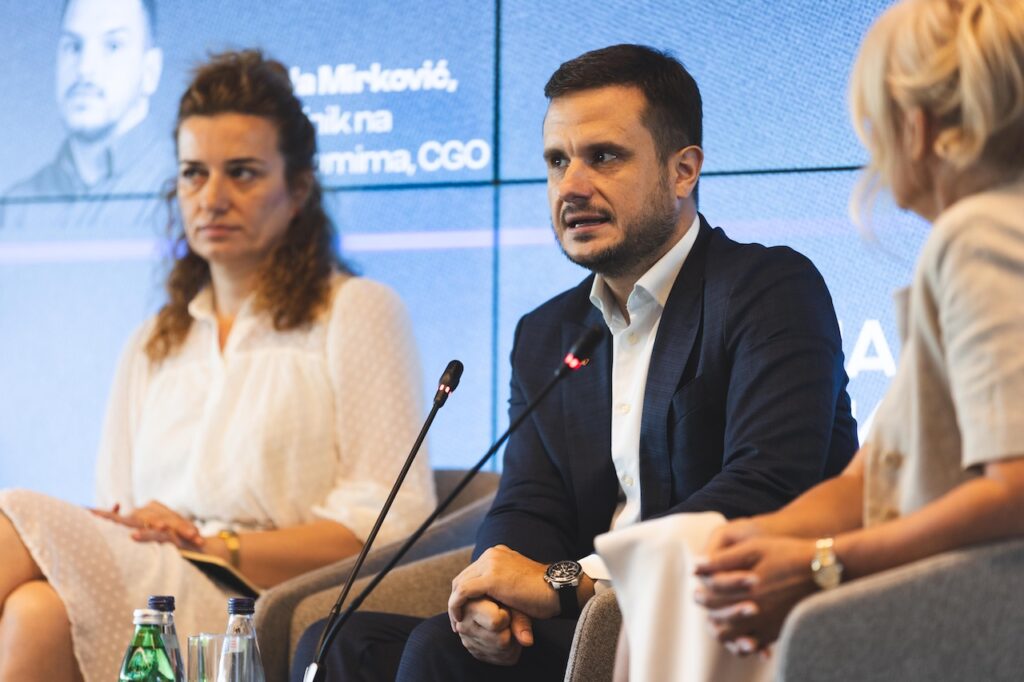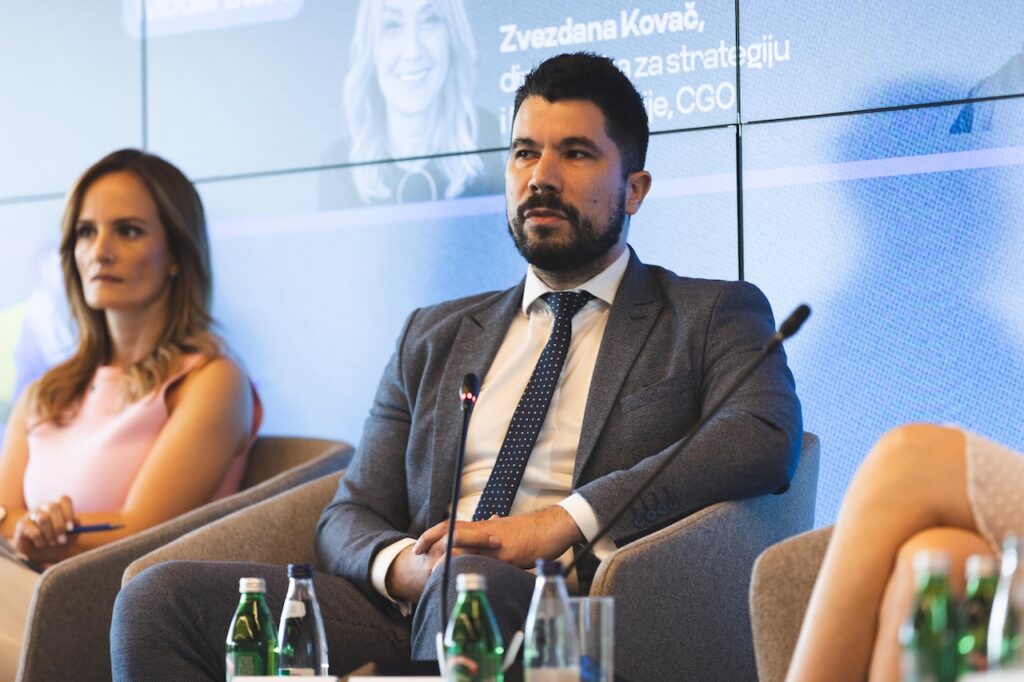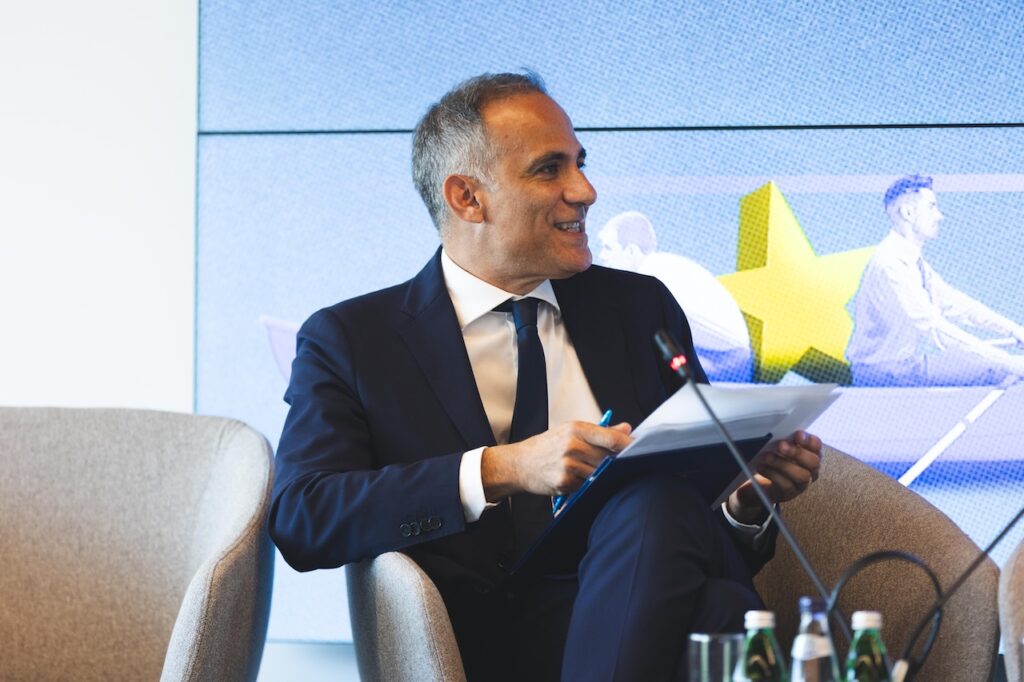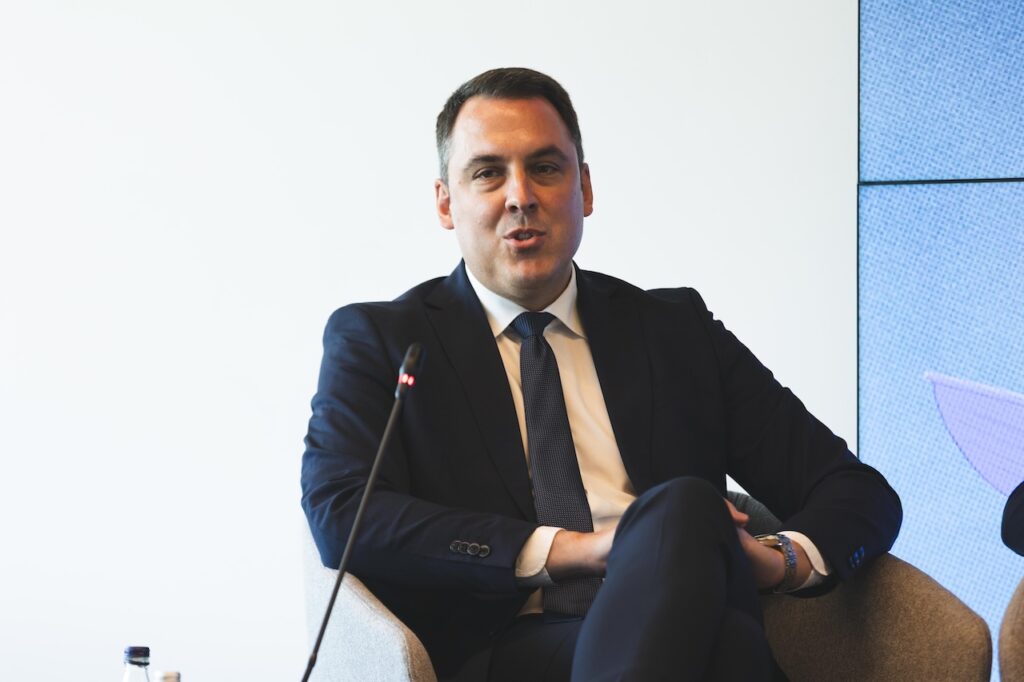Montenegro cannot complete negotiations with the European Union (EU) by the end of next year, stated former Minister of European Affairs Jovana Marović at the conference “13 Years on the European Path: Directions, Crossroads, and Detours,” organized by the Centre for Civic Education (CCE).
Speaking on the panel “Between Brussels’ Optimism and Domestic (In)Capacity: Who Holds the Keys to Progress?”, Marović said that Montenegro is facing a “crisis” in its EU accession path on technical, political, and strategic levels, and that “the country cannot close the negotiations within a year.”
According to Marović, Montenegro’s accession process appears forced, as did the recently held intergovernmental conference. “We’re trying to convince each other that things are going great, while we’re all fully aware of the crisis on all three levels. To join the EU, we must be impeccable on the technical, political, and strategic, i.e., values-based levels,” Marović noted.
She commented on frequent claims that the government’s heterogeneity is an advantage: “That would be beneficial if moderate forces were tempering the extremes, but that clearly isn’t the case.”
Marović emphasized that the complex relations with Croatia are not trivial, but that bilateral issues must be excluded from the negotiation process.
She stated that the government needs to have a Plan B and Plan C. “There’s nothing wrong if Montenegro joins the EU in 2029—that doesn’t change anything for us, only for the Europe Now Movement,” she explained.
Regarding Albania’s position on the EU path, she said, “It’s unfair for two countries to be lumped together. We need to stand out with tangible results in the rule of law. It’s also essential for the EU to commit, as the Union has a history of unfulfilled promises. Today, we still hear two voices – one positive from the European Commission, and the other less so from the member states.”
She added that Montenegro has no guarantees it will join in 2028 or 2029 even if it meets the requirements. “We need a declaration stating that we are working on an accession treaty. That treaty should require a track record of high-level corruption convictions, reforms in electoral legislation, and overall improvements in the judiciary and prosecution system,” she stressed.
Marović underlined the need for an independent judiciary: “We can’t simply replace one form of political influence with another. We must enter the EU as a country with independent institutions. Everything else can follow.”
Member of the European Parliament Vladimir Prebilič emphasized that what matters most for the EU is a national consensus in favor of accession, while also expecting tangible judicial results. “Something you can put on the table. There’s still much room for improvement in areas like corruption—we need both results and visible efforts to root it out,” said Prebilič.
Asked whether it’s possible to close the chapters by the end of next year, Prebilič said it’s difficult, but not impossible. “Our position is that bilateral issues should not affect negotiations. If there are problems, they should be discussed,” he added, noting that even the Slovenia-Croatia dispute over the Bay of Piran wasn’t resolved, yet both countries joined the EU.
According to Prebilič, the EU genuinely wants a success story in the Western Balkans, and Montenegro is the best example. He highlighted Montenegro’s strong public support for EU accession, unlike in some neighboring countries. The worst-case scenario, he said, would be for political instability to prevent the country from meeting its obligations. “If there’s a moment, it’s now. I hope you won’t prove that it can’t be done, because that would close the door for the entire region. We must do everything to prevent that scenario and ensure Montenegro becomes an EU member,” he concluded.
Montenegro’s chief EU negotiator, Predrag Zenović, said that exceptional progress had been made over the past year, and that there is a strong political climate in favor of integration. “It’s important that we all row in the same direction, since a positive outcome is within reach and the keys to that success are in our hands,” he said. When asked what the country could have done but didn’t, he replied, “I don’t see anything Montenegro failed to do.”
He reminded the audience that the focus had been on obtaining the Interim Benchmarks Assessment Report (IBAR), which was successfully achieved.
Zenović noted that while setting a deadline is limiting, it is also commendable. “It was a brave move that motivated the entire administration to work diligently,” he said, denying any redefinition of the deadlines.
On the issue of dealing with critics, Zenović stated that criticism is always welcome but must also come with proposed solutions in order to be constructive.
He said Montenegro has closed seven negotiation chapters – four under the new, more demanding methodology, and three before that. “Alongside the two closed by Serbia, this represents the only progress in chapter closures among the seven candidate countries. It may not be impressive, but it’s important that we each ask ourselves what more we could have done. I ask myself that every day,” Zenović said.
He added that Montenegro’s transformation does not end with EU accession. “It only guarantees that transformation will continue under the watchful eye of the Union. I have no illusions that Montenegro will be the European state I envision… But for me, the EU is an irreplaceable project.”
Speaking about Chapter 5 – Public Procurement, which was closed at the Intergovernmental Conference on Friday, he emphasized that effective policy implementation must be demonstrated.
Miloš Radonjić, Advisor for European Affairs to President Jakov Milatović, stated that the EU accession process is seen as a fundamental transformation of society, not just technical compliance. On the progress made, he said that success can be relative and absolute. “Montenegro has achieved relative success, but not absolute, as it doesn’t match the full potential of our society. All elements of society must work together to reach this goal,” said Radonjić.
He pointed out that while public support for EU membership is often highlighted, little attention is paid to maintaining that support.
Regarding the agreement the Government signed with the United Arab Emirates, Radonjić said it cannot be implemented without extra caution from Montenegro. “The agreement could have been better if the academic community and civil sector had been involved in a timely manner to ensure balance,” he concluded.
Assistant Professor at the University of Donja Gorica, Nikoleta Đukanović, recalled that promises were made to close six to nine chapters this year, but that number kept decreasing over time.
She believes the government includes democratic forces, which may be leading the technical aspect of negotiations, but remain a minority. “The question isn’t what Montenegro failed to do, but what it shouldn’t have done—but did anyway, thanks to that democratic minority. There have been many anti-European narratives, actions, and behaviors. It’s hard to plan, but responsibility must be taken if ambitious plans aren’t realized. Getting IBAR is easy; forgetting obligations is easier,” Đukanović noted.
“It’s impossible to speak of major progress amid all these problems. The unofficial EC document says it all about party-based hiring and nepotism,” she added, also pointing to serious human rights violations.
Deputy Head of the EU Delegation in Montenegro, Riccardo Serri, welcomed Montenegro’s closure of seven out of 33 chapters and the issuance of IBAR as a turning point. He reiterated the EU’s strong support for enlargement as a strategic priority, stressing that geopolitical shifts have played a role. In that context, he commended Montenegro’s alignment with EU foreign and security policy and its implementation of sanctions against Russia.
“There is no room to turn back. We must remain confident that this region will become part of the EU in a reasonable timeframe,” said Serri, underscoring that the Western Balkans remains a focus.
Serri said much work still lies ahead and that the accession process is merit-based. “Despite the geopolitical context, member states will not allow enlargement if technical criteria are not met,” he explained, noting that the process has slowed this year due to political issues and parliamentary tensions.
On the role of civil society in Montenegro’s EU accession, Serri praised NGOs for their contributions: “They closely monitor everything, provide constructive criticism, and that helps the entire process.”
Asked whether Montenegro could join the EU without meeting all the criteria, Serri reiterated: “Rules are rules, and benchmarks are benchmarks. They must be fully met before accession.”
On the EU’s monitoring of the appointment process for members of the Agency for Audiovisual Media Services, Serri said Chapter 10 is particularly relevant for Montenegro, connecting it with Chapters 23 and 24, all of which are closely watched by the EU.
Democratic Party of Socialists (DPS) MP and Chair of the Parliamentary Committee on European Integration, Ivan Vuković, stated that the opposition would fully support any step that moves Montenegro even a millimeter closer to the EU.
He noted that citizens overwhelmingly voted for pro-European, civic-oriented parties. “People voted for Montenegro to complete this process within a reasonable timeframe—but that hasn’t materialized,”said Vuković.
According to him, every time Montenegro made a good move, the ruling majority followed up with a decision that set the country two steps back. “First, we received IBAR, and then (Andrija) Mandić and his allies introduced the Resolution on Jasenovac to spoil relations with Croatia,” he explained. Vuković also claimed that the majority unconstitutionally removed Constitutional Court judge Dragana Đuranović, against the opinion of the Venice Commission.
“We fear that due to malign influences, our success won’t be enough. This has nothing to do with chief negotiator Zenović or Minister of European Affairs Maida Gorčević,” said Vuković.
The conference “13 Years on the European Path: Directions, Crossroads, and Detours” is part of a project implemented with the support of the SMART Balkans regional programme, carried out by the Centre for Civil Society Promotion (CPCD), the Centre for Research and Policy Making (CRPM), and the Institute for Democracy and Mediation (IDM), with financial support from the Norwegian Ministry of Foreign Affairs.
MINA agency

